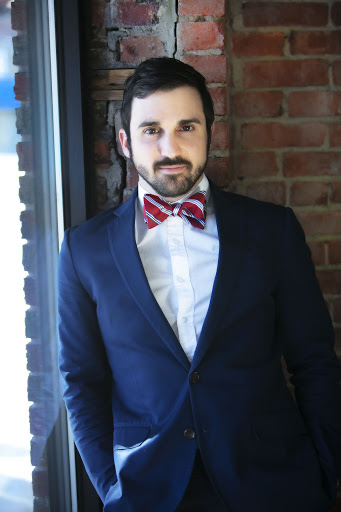Lawrence nonprofit pitches adding new public criminal defense option to help with court efficiency, jail population issues

photo by: Meeting screenshot/Criminal Justice Coordinating Council
Defense attorney Sam Allison-Natale is seen speaking to the Criminal Justice Coordinating Council about his nonprofit, Kansas Holistic Defenders, during a virtual meeting in February 2021.
Sam Allison-Natale wants to follow in his parents’ footsteps.
As a child of two public defense attorneys, he knew when he went to law school at New York University that he wanted to be one too.
“This is in my blood,” said Allison-Natale, a criminal defense attorney who previously served as a public defender in New York City for the nonprofit organization The Bronx Defenders.
Now in Lawrence, Allison-Natale is hoping to continue on the public defender path as he offers a potential alternative to the way that Douglas County currently handles criminal cases for people who cannot afford attorneys.
A public defender system has been a topic of conversation among county officials as a possible solution to court efficiency issues and to processing cases faster to reduce overcrowding in the county jail. The jail issue reached a crisis point last summer amid the ongoing coronavirus pandemic and as residents continued to oppose a now-abandoned plan to spend nearly $30 million to expand the jail.
Through a new nonprofit organization, Kansas Holistic Defenders, Allison-Natale wants to increase the options the district court has for appointing attorneys to individuals who can’t afford them. He also thinks the nonprofit, which would employ attorneys and social support staff, would be able to provide additional services — such as support for substance abuse, behavioral health and financial issues — to help defendants rehabilitate and decrease repeat offenses.
“So often as an attorney, if you are just doing the criminal defense part, you’re not really able to have a deep relationship with a client,” said Allison-Natale, who is chair for the nonprofit. “You might be in a position where you resolve their criminal case, but by that time they’ve been evicted or their kids are being taken away or they’ve lost their job.
“As an attorney, it’s incredibly demoralizing to be in a situation to feel like you are holding someone’s hand but unable to help,” he added. “Where our job is to be an advocate and a guardian, I don’t think we can do that fully unless we have the resources and expertise of people who aren’t lawyers involved in managing that criminal case.”

photo by: Contributed photo
Sam Allison-Natale, chair of Kansas Holistic Defenders, a new nonprofit that aims to provide public defense for criminal cases in Douglas County.
Whether Allison-Natale’s pitch is viable for Douglas County remains to be seen. Local defense attorney Shaye Downing recently voiced concerns about the venture during a Criminal Justice Coordinating Council meeting, suggesting a number of questions need to be addressed before she would support it.
Additionally, funding may be the biggest hurdle, as the nonprofit’s pitch includes Douglas County providing more than $600,000 to the organization on top of what the county already spends on court operations, as well as the the state possibly pitching in as well.
But the conversation is still in the early stages, as many details need to be worked out, Criminal Justice Coordinator Mike Brouwer said. The County Commission is slated to hear more information on the topic of public defense later this month during a work session on March 24.
Public defense already exists in Douglas County, of course — just not in the form of a central public defender office.
In Kansas, public defense is funded through the state and counties. Douglas County provides the funding for misdemeanor cases, while the state funds felony cases. Most of the cases in Kansas use public defense, as 85% of the statewide felony cases require appointed counsel, the Journal-World has reported.
Instead of through a central office, public defense is provided through a panel of private defense attorneys who are appointed by the court to take on individual cases. When appointed, they are paid a standard rate from funding provided by the state and county.

photo by: Meeting screenshot/Criminal Justice Coordinating Council
During a virtual meeting with the CJCC in February, Sam Allison-Natale explained his nonprofit Kansas Holistic Defenders would work alongside the current private attorney panel to provide public defense for criminal cases in Douglas County.
But Allison-Natale is adamant that his nonprofit would work alongside the current operation rather than supplant it. Under his proposal, Kansas Holistic Defenders would join the available options, providing a second group willing to take on cases. He said the organization wouldn’t be a competitor to the current private attorney panel, but instead would be a partner in spreading out the workload.
“One way we help is reducing the workload, and another way is taking on the clients who most need this kind of support,” Allison-Natale said.
If approved through some sort of contract with the county, the nonprofit plans to start out just serving individuals in misdemeanor cases. That would involve the county providing some funding to the organization.
Allison-Natale told the Journal-World the nonprofit currently estimates an annual cost of $660,000 to fund its operation with three attorneys, a social worker, an investigator and client advocate.
Currently Douglas County provides about $425,000 to the district court for indigent misdemeanor cases, Brouwer said.
But the nonprofit would not be fully reliant on the county, as it plans to pursue grants and community donations to support its mission. The organization hopes to present its vision to the County Commission this summer when the commissioners work on the county’s 2022 budget.
Meanwhile, the Kansas Board of Indigents’ Defense Services, or BIDS, is currently reviewing whether a state-operated public defender office is appropriate for Douglas County, Brouwer said. If established, that office would likely provide defense for the bulk of felony cases that need appointed counsel in the county.
Heather Cessna, BIDS executive director, told the CJCC in August that there are 18 public defender offices throughout the state. She said counties that do have public defender offices also have lists of attorneys who take appointments when the public defenders have conflicts or their caseloads are too great. She said one of the benefits of having a public defender’s office is increased institutional support from the state that otherwise does not exist.
Through the current operation of using a private attorney panel, BIDS paid about $829,000 to attorneys in 736 adult felony cases in Douglas County during the 2019 fiscal year, the Journal-World has reported. While the current panel of defense attorneys would likely still be used for some of those cases, Allison-Natale said his nonprofit hoped to eventually grow to take on felony cases as well, which would also require a contract with BIDS.
But understanding how BIDS plays into the county’s public defense may be years away. Cessna estimated that launching a Douglas County office would require about $810,000 of annual state funding. She said in August BIDS would need to receive additional funding support from the Kansas Legislature to launch it, and that likely wouldn’t be possible until at least the 2022 legislative session, the Journal-World reported.
But Cessna recently told the Kansas Legislature that BIDS was in “crisis” because of low pay and large caseloads, according to the Kansas Reflector. She said the state’s public defenders are working too many hours and being paid too little for their work, causing retention issues.
How that may affect the local push is not yet known. Officials for BIDS did not respond to the Journal-World’s request for comment.
But the conversation of changing how public defense operates in Douglas County is in the early stages. Brouwer noted that many more details need to be considered before any decisions are made, such as how much of a say Douglas County even has on the matter.
“I would say we are at the very beginning,” Brouwer said. “I think a lot of it is going to depend on what BIDS decides.”

photo by: Meeting screenshot/Criminal Justice Coordinating Council
Sam Allison-Natale speaks to the CJCC during a February 2021 meeting about his nonprofits plan to provide public defense to individuals facing criminal charges in Douglas County but cannot afford to pay for an attorney.
To begin operating in Douglas County, the Kansas Holistic Defenders may need to win over more than just the County Commission or BIDS.
After hearing Allison-Natale’s pitch at the February CJCC meeting, Downing said she wasn’t sure how a public defense for misdemeanors helps address the issues in Douglas County. Additionally, while Allison-Natale provided a study showing the nonprofit public defense option appears to work in large cities like Philadelphia, Downing said she has not seen such studies that suggest it could work for a much smaller community like Douglas County.
But Downing said she wasn’t against the idea. She said there a public defender office could serve as a united voice for criminal defense, which isn’t possible with private attorneys working separately.
“I think the criminal defense bar, in general, would certainly love to hear ideas about how we can be better and if there is going to be a public defenders office how we can collaborate with them to make sure everyone is getting justice that we all seemingly want,” Downing said.
County Commission Chair Shannon Portillo thanked Downing for her comments. As a member of Gov. Laura Kelly’s Commission on Racial Equity and Justice, Portillo said she knew that the commission recommends all communities larger than 100,000 people, which would include Douglas County, to have institutional public defense.
However, she said it seems the state is not going to provide the proper funding for indigent defense, and a local community effort could help counteract that.
“I’m excited that we are exploring some of the structural pieces on how we can move forward on this as a community, and I know the County Commission is excited to hear the next steps on this and how we can be part of it,” she said.
Contact Dylan Lysen
Have a story idea, news or information to share? Contact reporter Dylan Lysen:
- • dlysen@ljworld.com
- • 785-832-6353
- • Twitter: @DylanLysen
- • Read other stories by Dylan






